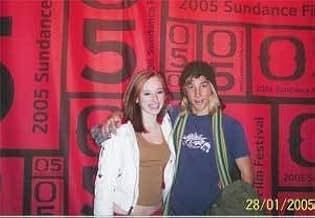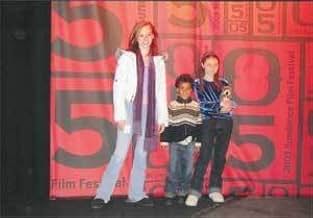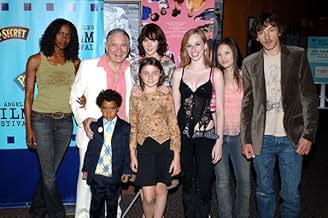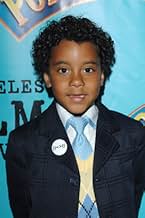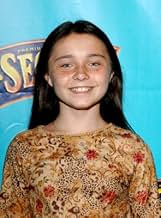VALUTAZIONE IMDb
7,2/10
37.878
LA TUA VALUTAZIONE
Un venditore di scarpe solitario e una eccentrica artista lottano per connettersi in questa visione unica della vita contemporanea.Un venditore di scarpe solitario e una eccentrica artista lottano per connettersi in questa visione unica della vita contemporanea.Un venditore di scarpe solitario e una eccentrica artista lottano per connettersi in questa visione unica della vita contemporanea.
- Regia
- Sceneggiatura
- Star
- Premi
- 22 vittorie e 15 candidature totali
Trama
Lo sapevi?
- QuizThe 1985 Honda Accord Christine drives in the film was July's own car, passed down from her grandmother.
- BlooperWhile Peter and Robby are singing the hymn to Richard, they walk past the same white picket fence three times.
- Curiosità sui creditiSpecial thanks to The Bertram Family
- ConnessioniFeatured in Siskel & Ebert & the Movies: The Best Films of 2005 (2005)
- Colonne sonoreWhere Are We Going
Written and Performed by Ryeland Allison
Published by Silver Outlet Music (BMI)
Courtesy of Silver Outlet Music America
Recensione in evidenza
Miranda July's "Me and You and Everyone We Know" might be the most miraculous first fiction feature by an American in 3 or 4 years; it's rivaled only by Andrew Bujalski's "Funny Ha Ha." Christine (July) stalks the recently separated Richard (John Hawkes), who would try anything to impress his kids, and gets third degree burns for his trouble. His elder son, Peter (Miles Thompson) longs for connections that go beyond instant gratification, while the younger Robby (Brandon Ratcliff) gets all the funniest lines, mostly copied and pasted from cybersex chats.
"Me and You" is about the act of pretending and about performance as life, but first of all it's about extremely likable characters played by likable actors, foremost among them July herself, whose Carole Lombard-meets-Laurie Anderson deep ditz may be a complex stack of masks upon masks, but is more likely just the way she is.
The movie is notable for what isn't in it - both malice and pain are almost absent. Removing malice - July's world is one in which a kid can safely walk alone through some seedy parts of Los Angeles - is unfashionable, brave and, given the gentle tone of the piece, necessary. But the absence of pain isn't intentional: July would like us to feel the loneliness of the characters. But their isolation is more a trait of their personalities than a source of suffering. In this respect, the movie is perhaps too glossy for its own good. There's one excellent exception, revolving around a granddaughter's photo by an elderly woman's bedside, which becomes a substitute for a shared life that dissolved too soon.
The scene that everyone picks out is the walk to Tyrone Street. Richard and Christine decide the walk to the intersection will stand in for the relationship they're not having: first the unrelieved joy of being together, then the getting bored with each other, then the fighting and the split. Only they keep chatting flirtily, about whether the walk represents a year and a half or twenty, until they get to the corner, and then we wonder how they can possibly go their separate ways. Although this is as great as anything in the first 75 minutes of "Before Sunset," its emphasis is much more on romantic comedy than the rest of the movie. There are more typical scenes that approach this quality. A goldfish on the roof of a car. A child running his fingers through a woman's hair. A picture of a bird in a tree, in a tree. And the ending, where it seems human actions are motivating the sunrise.
The scene I consider the finest is a quiet one: Sylvie (Carlie Westerman), a tween spending her childhood preparing for life as a homemaker, gets a gift from Peter: a plush bird. ("It's for your daughter.") It would be unusual merely for depicting a platonic friendship between kids of different genders and different ages. But it's remarkable for crystallizing what it seems every filmmaker is trying to say these days: that there's something to be gained from thinking like a child. Through July's lens, it doesn't seem like a regression: no redundant literalization of fantasy is necessary. The achievement of "Me and You and Everyone We Know" is to show how the mundane moments of our lives can be mundanely transformed by imagination.
"Me and You" is about the act of pretending and about performance as life, but first of all it's about extremely likable characters played by likable actors, foremost among them July herself, whose Carole Lombard-meets-Laurie Anderson deep ditz may be a complex stack of masks upon masks, but is more likely just the way she is.
The movie is notable for what isn't in it - both malice and pain are almost absent. Removing malice - July's world is one in which a kid can safely walk alone through some seedy parts of Los Angeles - is unfashionable, brave and, given the gentle tone of the piece, necessary. But the absence of pain isn't intentional: July would like us to feel the loneliness of the characters. But their isolation is more a trait of their personalities than a source of suffering. In this respect, the movie is perhaps too glossy for its own good. There's one excellent exception, revolving around a granddaughter's photo by an elderly woman's bedside, which becomes a substitute for a shared life that dissolved too soon.
The scene that everyone picks out is the walk to Tyrone Street. Richard and Christine decide the walk to the intersection will stand in for the relationship they're not having: first the unrelieved joy of being together, then the getting bored with each other, then the fighting and the split. Only they keep chatting flirtily, about whether the walk represents a year and a half or twenty, until they get to the corner, and then we wonder how they can possibly go their separate ways. Although this is as great as anything in the first 75 minutes of "Before Sunset," its emphasis is much more on romantic comedy than the rest of the movie. There are more typical scenes that approach this quality. A goldfish on the roof of a car. A child running his fingers through a woman's hair. A picture of a bird in a tree, in a tree. And the ending, where it seems human actions are motivating the sunrise.
The scene I consider the finest is a quiet one: Sylvie (Carlie Westerman), a tween spending her childhood preparing for life as a homemaker, gets a gift from Peter: a plush bird. ("It's for your daughter.") It would be unusual merely for depicting a platonic friendship between kids of different genders and different ages. But it's remarkable for crystallizing what it seems every filmmaker is trying to say these days: that there's something to be gained from thinking like a child. Through July's lens, it doesn't seem like a regression: no redundant literalization of fantasy is necessary. The achievement of "Me and You and Everyone We Know" is to show how the mundane moments of our lives can be mundanely transformed by imagination.
- chuzzlewit-1
- 2 mag 2005
- Permalink
I più visti
Accedi per valutare e creare un elenco di titoli salvati per ottenere consigli personalizzati
- How long is Me and You and Everyone We Know?Powered by Alexa
Dettagli
- Data di uscita
- Paesi di origine
- Siti ufficiali
- Lingua
- Celebre anche come
- Я, ти і всі, кого ми знаємо
- Luoghi delle riprese
- Aziende produttrici
- Vedi altri crediti dell’azienda su IMDbPro
Botteghino
- Budget
- 800.000 USD (previsto)
- Lordo Stati Uniti e Canada
- 3.885.134 USD
- Fine settimana di apertura Stati Uniti e Canada
- 30.801 USD
- 19 giu 2005
- Lordo in tutto il mondo
- 8.012.838 USD
- Tempo di esecuzione1 ora 25 minuti
- Colore
- Mix di suoni
- Proporzioni
- 1.85 : 1
Contribuisci a questa pagina
Suggerisci una modifica o aggiungi i contenuti mancanti

Divario superiore
By what name was Me and You and Everyone We Know (2005) officially released in India in English?
Rispondi

